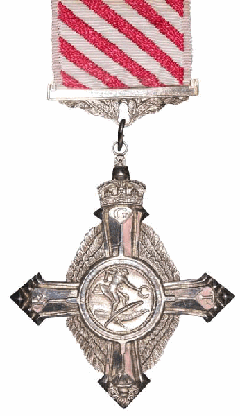
The Air Force Cross (AFC) is a military decoration awarded to officers, and since 1993 other ranks, of the British Armed Forces, and formerly also to officers of the other Commonwealth countries. It is granted for "an act or acts of exemplary gallantry while flying, though not in active operations against the enemy". A bar is added to the ribbon for holders who are awarded a further AFC.
To be mentioned in dispatches describes a member of the armed forces whose name appears in an official report written by a superior officer and sent to the high command, in which their gallant or meritorious action in the face of the enemy is described.

The Air Force Medal (AFM) was a military decoration, awarded to personnel of the Royal Air Force and other British Armed Forces, and formerly to personnel of other Commonwealth countries, below commissioned rank, for "an act or acts of valour, courage or devotion to duty whilst flying, though not in active operations against the enemy". The award was discontinued in 1993 when all ranks became eligible for the Air Force Cross (AFC) as part of the reform of the British honours system.

The Conspicuous Gallantry Medal (CGM) was, until 1993, a British military decoration for gallantry in action for petty officers and seamen of the Royal Navy, including Warrant Officers and other ranks of the Royal Marines. It was formerly awarded to personnel of other Commonwealth countries. In 1943 a Royal Air Force version was created for conspicuous gallantry in action against the enemy in the air.

The Tshumelo Ikatelaho - General Service Medal was instituted by the President of the Republic of South Africa on 16 April 2003, and came into effect on 27 April 2003. It can be awarded to all ranks who have participated in military campaigns or operations which, while not warranting the institution of particular campaign medals, still justify the award of a medal for general service. The bilingual title of the medal is in Tshivenda and English.

The Africa Service Medal is a South African campaign medal for service during the Second World War, awarded to members of the Union Defence Forces, the South African Police and the South African Railways Police. The medal was originally intended for service in Africa, but it was later extended to cover service anywhere in the world.
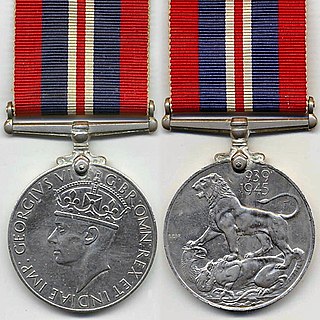
The War Medal 1939–1945 is a campaign medal which was instituted by the United Kingdom on 16 August 1945, for award to citizens of the British Commonwealth who had served full-time in the Armed Forces or the Merchant Navy for at least 28 days between 3 September 1939 and 2 September 1945.

The King's Commendation for Bravery and the King's Commendation for Bravery in the Air are United Kingdom awards, open to both military personnel and civilians. They were established in 1994, when the award of the Queen's Commendation for Brave Conduct and the Queen's Commendation for Valuable Service in the Air were discontinued.

The Gulf War Medal was a campaign medal approved in 1992, for issue to officers and men of British forces who served in Kuwait and Saudi Arabia during Operation Granby in 1990–91.

The Iraq Medal was authorised on 23 February 2004. It was a campaign medal issued to members of the British Armed Forces and certain attached personnel, who served between 20 January 2003 and 22 May 2011 on, or in support of, Operation Telic - the designation for British operations during the 2003 Invasion of Iraq and its aftermath.

The Operational Service Medal for Sierra Leone is a campaign medal established in 2000 by the Ministry of Defence of the United Kingdom for participation in the British military intervention during and after the Sierra Leone Civil War, from May 2000 to July 2002.

The Operational Service Medal for Afghanistan is a campaign medal previously awarded by the Ministry of Defence of the United Kingdom for service by British Armed Forces personnel in support of the post-2001 Afghan War.

The Operational Service Medal for the Democratic Republic of the Congo is a British armed forces campaign medal, awarded mostly to military personnel who served between 14 June and 10 September 2003 on Operation Coral.
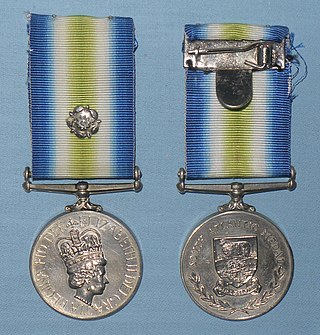
The South Atlantic Medal is a British campaign medal awarded to British military personnel and civilians for service in the Falklands War of 1982 between the United Kingdom and Argentina. Over 33,000 medals have been awarded. The South Atlantic Medal Association was formed in 1997 for recipients of the South Atlantic Medal.
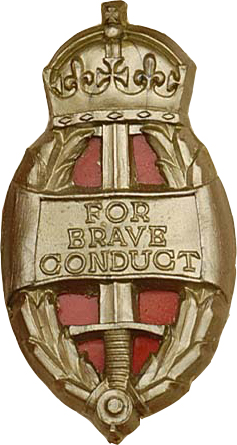
The Queen's Commendation for Brave Conduct, formerly the King's Commendation for Brave Conduct, acknowledged brave acts by both civilians and members of the armed services in both war and peace, for gallantry not in the presence of an enemy. Established by King George VI in 1939, the award was discontinued in 1994 on the institution of the Queen's Commendation for Bravery.

The Meritorious Service Medal (MSM) is a British medal awarded to Senior Non Commissioned Officers and Warrant Officers of the British armed forces for long and meritorious service. From 1916 to 1928, eligibility was extended to cover both valuable services by selected other ranks irrespective of length of service, and for gallantry not in the face of the enemy.
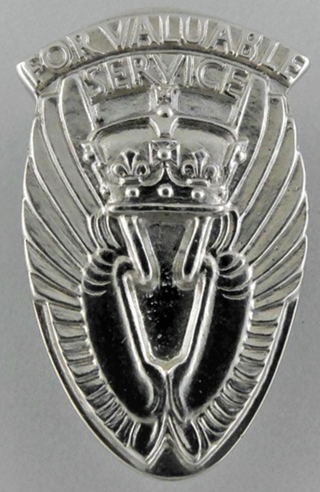
The Queen's Commendation for Valuable Service in the Air, formerly the King's Commendation for Valuable Service in the Air, was a merit award for flying service awarded by the United Kingdom between 1942 and 1994. It was replaced by the Queen’s Commendation for Bravery in the Air and the Queen's Commendation for Valuable Service.

The King's Volunteer Reserves Medal (KVRM), originally the Queen's Volunteer Reserves Medal (QVRM), was created by Royal Warrant of Queen Elizabeth II on 29 March 1999. Only 13 King's Volunteer Reserves Medals may be awarded in a year. The medal is presented only to members of the Volunteer Reserves of the British Armed Services for exemplary meritorious service in the conduct of their duties. The KVRM is a Level 3 award and ranks in military order of wear immediately after the British Empire Medal. It is the first exclusive award to Volunteer Reserves that is presented at an investiture. The first awards were announced in the 1999 Queen's Birthday Honours with these first awards presented at an investiture on 5 November 1999.
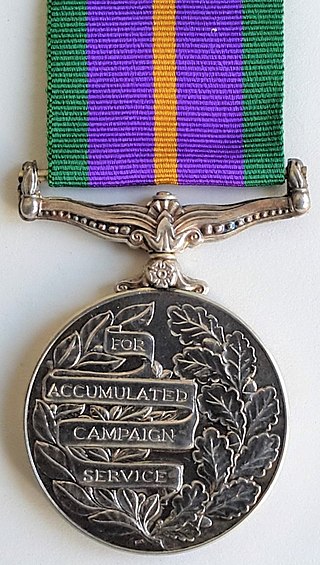
The Accumulated Campaign Service Medal and the Accumulated Campaign Service Medal 2011 are medals awarded by King Charles III to members of his Armed Forces to recognise long campaign service. The original Accumulated Campaign Service Medal, instituted in January 1994, was awarded to holders of the General Service Medal (1962) who had completed 36 months of accumulated campaign service. The replacement Accumulated Campaign Service Medal 2011 is now currently awarded to holders of various campaign service medals who have completed 720 days of campaign service.
The Armed Forces of India are eligible for many military decorations awarded for extraordinary bravery and distinguished service during times of war and peace. Service and campaign medals have been awarded throughout India's history as an independent state.


















